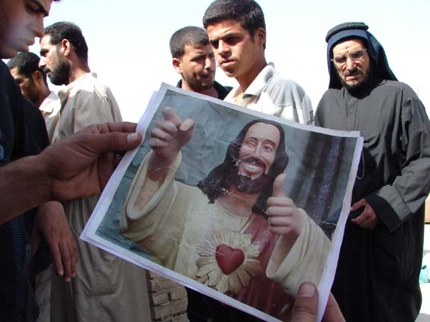The Center for Socialist Studies will hold a seminar on Discrimination against Copts in Egypt, Friday 3 November.
The First Session, 1pm to 2:30 pm: The Roots of the Problem
The session will try to situate the historical roles of the parties involved, the Egyptian state, Coptic Church, and the Coptic masses, within the socio-economic and political contexts. The session will try to answer questions including: Did the rise of political Islam trigger a sectarian polarization? Is the state a neutral arbitrator or part of the problem? Is the Coptic Church confronting the current status quo, or reinforcing it?
The Second Session, 3pm to 4:30pm, The Stand towards the Coptic Question:
This session will shed light on the class factors and stands of different political tendencies towards the Coptic Question and the alternatives for emancipation. The role of the Diaspora Copts will be discussed, together with questions regarding: Is the Secular State a solution? How do the Muslim Brothers deal with the concept of “citizenship”?
The Third Session, 5pm to 6:30pm, Developing a Leftist View of the Coptic Question
The Seminar will be attended by representatives of different political tendencies. The Center is located 7 Mourad Street, Giza.
(Above: Security agents breaking the leg of a Coptic protestor, during Alexandria’s sectarian rioting last April. Photo by Nasser Nouri)
شـــــــــارك معنا… إن توØيد الصÙ�ÙˆÙ� Ù�ÙŠ مواجهة الإمبريالية والاستبداد يتطلب مواجهة قضايا Ù…Øورية وشائكة، منها قضية التمييز ضد المسيØيين المصريين. وتأكيدا منا على ضرورة إدراك القوى الوطنية لأهمية القضية وأهمية بلورة موقÙ� مشترك تجاهها.يقيم
مركز الدراسات الاشتراكية سيمينار بعنوان
المسألة القبطية: بين الإنكار والتبعية للإستعماروذلك بوم الجمعة 3/11/2006برنامج اليوم:
1-2:30 ظهرا
الجلسة الأولى : جذور المشكلة
تتناول هذه الجلسة بØØ« وتØليل لجذور مشكلة التمييز الديني Ù�ÙŠ مصر مشتملا على الدور الذي لعبته، وما زالت تمارسه الدولة Ù�ÙŠ مقابل دور الكنيسة وجماهير الأقباط وذلك Ù�ÙŠ إطار التطورات الاقتصادية، والاجتماعية والسياسية التي شهدتها الساØØ© المصرية.
ونØاول Ù�ÙŠ هذه الجلسة الإجابة على عدة تساؤلات منها: هل أدى صعود الإسلام السياسي إلى عملية استقطاب على أساس ديني؟ أين الØقوق التي يكÙ�لها الدستور المصري لأقباط من ممارسات الدولة؟ الدور الذب لعبته الكنيسة Ù�ÙŠ تعزيز الوضع القائم أو مواجهته؟
3:00-4:30:مساء
الجلسة الثانية: الموق� من مسألة الأقباط
تØاول هذه الجلسة إلقاء الضوء على المواقÙ� المختلÙ�Ø© من المسألة القبطية والØلول المطروØØ© للتعامل معها. ÙˆÙ�ÙŠ هذا الإطار Ù†Ø·Ø±Ø Ø¹Ø¯Ø¯ من القضايا مثل الدور الأمريكي وعلاقته بأقباط المهجر. وكذلك البعد الطبقي لهذه المسألة. ÙˆØªØ·Ø±Ø Ø§Ù„Ø¬Ù„Ø³Ø© أسئلة ملØØ© منها: هل الدولة العلمانية هي الØل؟ كيÙ� بتعامل الأخوان المسلمين مع Ù…Ù�هوم المواطنة؟
5:00-6:30 مساء
الجلسة الثالثة تطوير رؤية يسارية من المسألة القبطية
تركز هذه الجلسة على إجابة السؤال التالي: هل هناك رؤية يسارية موØدة Øول مسألة التمييز الديني؟
يشارك �ي الجلسات ممثلون من مختل� القوى السياسية، وذلك �ي مقر المركز : 7 شارع مراد- الجيزة



